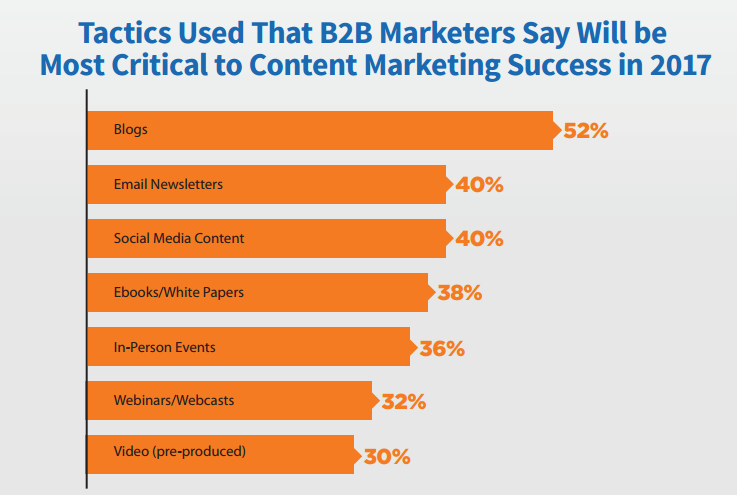Many businesses still don’t see the importance of investing in a blog, and they’re missing out on a lot of opportunities. Blogs, when done right, are reliable sources of information, education, entertainment, and are essential tools in achieving marketing, business and even personal goals.
Interestingly, even with the massive influx of blog content in the past year, Content Marketing Institute reports that blogs were still the number one content type that is perceived to be important for B2B marketers in 2017.

Incidentally, this is also one of the insights reflected in the State of Inbound, where blogging remains to be the number one priority of Inbound Marketers.
If that’s not enough to convince you, here are 12 reasons why you need to get your blogging groove on this 2018.
1. Blogging is the most crucial tactic to achieve Content Marketing success, according to top performing B2B marketers.
As seen in the graph above, 52% of B2B marketers claim that blog content is still the most critical tactic to achieve content marketing success. More so, blogging is the gateway to practically every inbound marketing funnel. In fact, it plays a crucial role in every stage of the funnel (Attract, Convert, Close, Delight), which makes it quite important don’t you think?
2. Blogging is the most cost-efficient way to do Content Marketing.
When we talk about “Content Marketing”, in a general sense, we’re talking about a strategy that encompasses a myriad of content types and mediums, both offline and online. This means combining various digital and traditional formats, like producing a TV advertisement and supporting it with a hashtag or a Facebook page. Or developing a content-driven website and promoting it with events, media launch, or bill boards.
One content strategy that has been tested and proven to deliver results is blogging.
Now, consider the costs it would take to create a TV/magazine advertisement or a bill board—the hours spent, the professional fees, media buying, logistics. Compare that to the costs of creating and maintaining a blog—Wordpress (FREE), your Content team, lots of coffee. Now factor in the number of random people who will chance upon your traditional advertisement, versus the number of targeted audience that will find your blog through Google or social media. Do the math.
Not to devalue traditional advertising, but blogging does have the potential to reach your target audience in a way that traditional advertising can’t, and at a fraction of the cost.
3. Blogging makes your site more visible in search engines.
Since the early days, SEO industry experts already use blogging to improve search engine visibility. Of the many SEO tactics that don’t work anymore, blogging (if done right) remains to be effective. How? There are four important SEO factors that make a site rank better in Google — (1) keywords, (2) fresh content, (3) social signals and (4) links. Consistent blogging hits all of these targets.
- Blogs naturally inject relevant keywords into your site, and not in a spammy, keyword-stuffing kind of way.
- Blogs refresh your site with new content regularly, and Google gives plus points to fresh content.
- Blogs increase opportunities for social media activity, and social signals affect search engine rankings.
- Blogs, especially the ones with targeted and valuable content, attract quality links. In fact, companies who blog have 97% more inbound links.
4. Blog posts are accessible 24/7.
How many times have you bookmarked a blog post so that you can read it later? Or how many times have you googled a brand or a product in the wee hours of the night and ended up in someone’s blog?
Granted that you have a reliable server or an unlimited bandwidth, your blog posts are always accessible to your readers. Whether they landed on your site because they were searching for something on Google, or they intentionally looked for your brand, or they’ve been following your blog already, they can consume blog content anytime and as long as they want.
30-second commercials or billboards are only visible for short periods of time and therefore have a small window of opportunity to convince a potential customer to make a purchase. Blogs, on the other hand, are accessible as the need arises, and from anywhere in the globe. Even old posts will continue to generate traffic and inquiries. The more you blog, the more chances for your site to attract an audience.
5. Your blog serves as your portfolio.
Whether for personal or business purposes, your blog is a channel through which you can show potential clients what you can do. This is specifically valuable to freelancers, B2B companies or SAAS who offer highly technical or specialized products and services.
Your blog is your own case study. Make it a good one.
6. Blogs allow existing and potential customers to get to know you and trust you.
Consider your blog as your living room or receiving area. This is where you welcome your guests, entertain them, get to know them. This is where you tell them your story or show them (in a nonchalant way) what you can do for them.
You can know a lot about a company just by reading its blog, if it has one. Through the blog posts, you get a glimpse of the company culture, the industry, the services it offers, what they’re passionate about.
Here at Spiralytics, we like tracking the number of people who touched base with us after finding us through one of our blog posts, many of which end up becoming employees or clients.
We like to think that it’s easier for these people to trust us because they got a glimpse of who we are through this blog.
7. Blogs help potential customers in their buying process.
As consumers ourselves, we know how much we rely on blog reviews when we want to purchase anything. We do a thorough research about the brand, the company or the person we want to do business with. In fact, blogs have been rated as as the 5th most trusted source for accurate information online. And 70% of consumers learn about a company through content rather than ads.
Imagine if you have the answers to your target market’s questions on your blog. A great blog is one that is designed to answer these questions and lead your readers into your sales funnel in a subtle way. In any case, whether it results to a purchase or not, you help people know and understand their choices, and if you ask me, helping others make decisions is a noble reason to blog too.
8. Blogging causes you to learn, experiment, and hone your craft.
Blogging requires discipline. Maintaining an editorial calendar, coordinating with writers and graphic designers, not to mention coming up with relevant topics, researching, and translating ideas to words require a lot of discipline.
For us, this blog serves us a lot of purposes. We experiment a lot on these pages. We spend a lot of time analyzing our traffic stats to understand our readers better. We use this to learn, understand and enhance our Content strategy with the end goal of enhancing the services we offer our clients.
Our blog serves also as a team learning activity for us. Every Wednesday we would sit together and do a round table discussion of what works and what doesn’t, and throw ideas for future blog posts. We report the blog posts that perform well, and acknowledge the person who’s responsible for that post. We grow a lot as individual bloggers and as a team because of this blog.
9. Blogging inspires.
We all need inspiration, and blogging inspires both the blogger and the readers. Metrics aside, I find it fulfilling when someone comes up to me and tells me that something I’ve written inspired him to think and move. I believe in doing work that doesn’t only pay the bills but makes the world around you a better place too. And personally I’m able to do just that by blogging. I love that through this platform I can inspire and educate, all while doing what I love to do (writing, and building relationships, and helping brands tell their story).
And then of course, when someone is inspired by something that he/she reads, there’s a big chance that he/she will share that to his/her friends. Boom. You earn some social shares, maybe a link, and you go back to the 2nd item in this list where all of these put together improve your site’s value and ranking.
10. Blogs establish your credibility and authority as a thought leader.
When you blog about a specific niche or discipline consistently and passionately, you naturally establish yourself as a thought leader in that category. Are you an Interior Designer? Blog about inspiring spaces, and design trends, and DIY home improvement ideas. Are you a Freelance Writer? Blog to show your writing style and skills! Are you in the bank or financing industry? Blog to answer frequently asked questions about money and investments.
Sounds pretty straightforward, yeah? If you’re an expert at something, blog about your expertise and watch as your traffic grows with visitors who are looking for exactly what you’re good at.
11. Blogs open opportunities for offline relationship-building and interaction.
Blogs are great for these two things: (1) It represents your brand online, (2) Makes it easier for you to build relationships offline. As a niche blogger myself, I have met a lot of bloggers online that eventually became real-life friends and business partners. Because your blog already speaks a handful about your interests, your passions, and topics that are related to your business, readers already know a lot of things about you even before they meet you face to face. You skip much of the awkward introductions.
Blogs are also great in closing deals. Many of our clients found us through this blog, and pretty much already know who we are and what our process looks like through our posts. When our readers reach a point of interest, they contact us for further discussion, which then allows us to meet them in person and present to them the services we offer in full detail.
12. Your competition is most likely blogging.
It is very unlikely that we find a niche where personal and company blogs are not present. Chances are, your competition is part of the 81% of companies who consider their blogs useful or critical to their business. You have two options, then. (1) Let the bloggers steal all of the online traffic from keywords that are relevant to your business, while you spend a lot of money on ad campaigns, brochures and fliers; or (2) Blog to add long-term value to your website, then watch as your traffic (and eventually, sales) grow over time.
Blogging is big deal, guys. Give it one year. Fine, give it 6 months. Commit to a blog, dedicate resources, answer Frequently Asked Questions, inspire, entertain, inform. See if it doesn’t work for your business or add value to your professional growth. I’ll do a money back guarantee if you paid me anything by reading this post, but since there’s no money to pay back, I’ll simply suggest you do yourself a favor and give it a try.





